The Truth About the Yamhelas-Westsider Trail
Yamhill County, Oregon
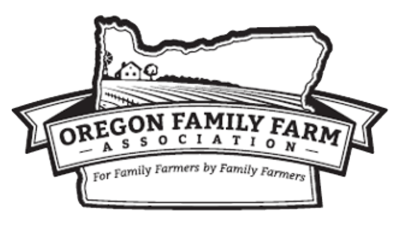
Dear Yamhill County resident,
Over the past few weeks there has been an ill-advised effort to recall a new Yamhill County Commissioner, who has strongly defended Yamhill County family farmers and has followed the legal instructions of the Oregon Land Use Board of Appeals (LUBA).
The Oregon Family Farm Association (OFFA) believes it is important to set the public record straight.
We have compiled this booklet to combat the false claims by the well-funded advocates of the Yamhelas-Westsider Trail project who have attempted to bypass Oregon land use laws over the past few years. The OFFA feels strongly that projects that impact our farmers need to be handled with careful consideration and planning.
The OFFA will also defend those public servants who defend Oregon family farmers and we will fight attempts to slander those public officials who are committed to following the law.
While we all enjoy recreational opportunities in the communities we live in, we do not support projects that blatantly violate Oregon’s land use laws and negatively impact farming activities. It is clear from the timeline and records included in this booklet, that several Yamhill County Commissioners (specifically former Yamhill County Commissioners Mary Stern, Stan Primozich and Rick Olson, and current Yamhill County Commissioner Casey Kulla), joined special interests and pushed county staff to plan, implement and spend taxpayer resources on a trail project that had no legal land use approval. These county commissioners should have followed state law BEFORE spending taxpayer money on this project.
In fact, records show that the advocates of the Yamhelas-Westsider Trail misled and convinced the Oregon Department of Transportation (ODOT) that there was no local opposition to the trail by farm families, and that the permits required to build the trail would be obtained with no issue.
This dishonest failure played out over several years and ultimately forced local family farmers to sue Yamhill County to protect their private property rights. The Land Use Board of Appeals (LUBA) consistently sided with Yamhill County’s farmers and remanded the project back to Yamhill County. When the County realized the likelihood of gaining legal permits for the trail was improbable, county counsel misled LUBA and claimed that parts of the trail (the Stag Hollow Creek Bridge) were for “fire truck access” and would not be accessible to the public. LUBA rejected the County’s claim and found the claim so egregious that they forced Yamhill County to pay the local farmers’ attorney fees.
In response to these problems, ODOT told the County that they had lost faith in the project, and that previously awarded grant money would need to be repaid.
Those responsible for this public policy failure have attempted to pass the responsibility of the trail’s demise onto current Commissioners Mary Starrett and Lindsay Berschauer and claim that the repayment of grants was triggered by Commissioners Starrett and Berschauer accepting LUBA’s decision and dealing with a bad situation. However, public records prove that the County always knew that they would owe the money back based on their failure to secure the necessary land use permits and ensure that the trail would be open to the public.
The Board of Directors of the Oregon Family Farm Association felt that it was necessary for the public to know the timeline and facts behind why this project failed, and to ensure that when government engages in activity that runs contrary to the state courts, that they are held accountable.
We thank current Yamhill County Commissioners Mary Starrett and Lindsay Berschauer for standing strong and upholding the property rights of our generational farmers and defending Yamhill County taxpayers from efforts that waste limited county resources.
Sincerely,

Matt Cyrus
Board President, Oregon Family Farm Association

Ben Vandyke
Ben Vandyke Farms Inc, Yamhill
![]()
Greg and Celine McCarthy
Yamhill County

Scott Bernards
Redwood Farms, Carlton

Allen Sitton
Sitton Brothers Farms, Carlton
Summary
Yamhill County set out to purchase the old Union Pacific rail line in hopes of converting it into a multi-use transportation corridor, with pedestrian and bicycle paths that eventually would parallel commuter (light) rail.
Yamhill County Commissioners voted to include the Yamhelas-Westsider Trail into the transportation plan after they were told that adjacent landowners and farmers had no objections to the trail project.
The County entered into grant agreements with the federal government and Oregon Department of Transportation (ODOT) for multi-millions of dollars to purchase, plan and build parts of the corridor project, with a promise that land use approval for the trail would be imminent.
In 2017, Yamhill County entered into a Connect VI (COVI) grant agreement with ODOT for $1.012M to design three bridges for the trail project and construct the Stag Hollow Creek Bridge.
Later that year, the County acquired the old railroad right-of-way with a $1.7M federal grant.
The County proceeded with the design and commenced construction of the Stag Hollow Creek bridge, prior to having full land use approval.
Farmers who live adjacent to the trail project and bridge filed an appeal with the Land Use Board of Appeals (LUBA) alleging that the County was in violation of state land use laws.
The County challenged the farmers on their claims and LUBA, over the course of two years, issued a total of five remands of the project.
In the last remand, Yamhill County Counsel Todd Sadlo made the case to LUBA that the Stag Hollow Bridge was for emergency vehicle access not the trail, therefore it did not require a land use permit to build.
LUBA rejected Sadlo’s argument and found it so egregious and irresponsible that LUBA issued an Order demanding that Yamhill County reimburse the farmers’ attorney fees for the appeal. This was an unprecedented decision by LUBA.
In June of 2020, ODOT lost confidence that the project was feasible and demanded that Yamhill County repay the Connect VI grant due to the improbability that the county would obtain the necessary land use approval needed to build the trail and its associated bridges for public use.
Yamhill County sought a compromise that would extend the deadlines to have the Yamhelas-Westsider Trail open to the public, figuring they could hold off construction until new, trail-friendly county commissioners were elected. ODOT agreed to the compromise and told the County that they needed to sign an amendment to the Connect VI grant to extend the deadlines.
Simultaneously, county staff scrambled to consider options to offload the trail project to friendly groups like “Friends of the Yamhelas-Westsider Trail” non-profit or Chehalem Parks & Recreation District (CPRD) in order to circumvent the election of Lindsay Berschauer. Berschauer was vocally opposed to the trail project during her campaign, and elected by wide margins in May of 2020.
Yamhill County took months to deliberate the COVI amendment, and in December of 2020, still had not agreed to sign it despite a last-ditch effort to convene the Board of Commissioners and get it done. Commissioner Casey Kulla blasted the move, claiming that the County would now be on the hook for repayment of the COVI grant.
On January 4th 2021, Commissioner Lindsay Berschauer, who openly opposed the Yamhelas-Westsider Trail project, was sworn into office.
In February, it was discovered that the County had misrepresented the completion status of the Stag Hollow Bridge and revealed that additional grants would be necessary to cover construction costs. Commissioners Mary Starrett and Lindsay Berschauer voted to withdraw the Trail’s land use application because the county still had no legal right to construct the bridge or trail and costs were continuing to escalate.
In May of 2021, local farmers who challenged the land use approval of the Yamhelas-Westsider Trail filed an ethics complaint with the Oregon State Bar against County Counsel Todd Sadlo alleging violations of multiple legal ethics rules while he purported to represent the County. The Oregon State Bar has opened an investigation into the behavior of Mr. Sadlo, who decided to retire from Yamhill County on August 31, 2021.
In summary, Yamhill County recklessly spent millions in taxpayer money before the trail had received legal land use approval. Yamhill County knew that the approval of a recreational trail in the middle of Exclusive Farm Use land was improbable at best. When challenged, the County marginalized local farmers, violated ethics laws, and worked to circumvent the election of County Commissioner Lindsay Berschauer in an attempt to push the project forward. Despite their attempts, county staff knew in December of 2020 that they would be required to pay grant money back to ODOT.
We commend Commissioners Starrett and Berschauer for upholding the private property rights of Oregon’s generational farmers and putting a stop to this illegal project.
The Facts
October 5, 2015 – County signed a grant application with the Oregon Department of Transportation promising local support to convert an old railroad right-of-way to a public recreational trail. The County never once discussed the matter with the adjoining farmers most adversely affected.
November 2017 – In a non-public process, the county acquired the old railroad right-of-way from Union Pacific Railroad, spending a significant amount of public money without first making any effort to know whether the trail could ever meet Oregon and county land use laws.
Spring 2018 – ODOT required the county to spend the grant on approved trail projects or repay the grant. Staff rushes the trail through a “legislative” approval process, trying to shortcut the onerous approval standards and processes that really applied. Among other things, they ignored the county’s own conditional use permit standards. They ignored that significant parts of the property are in zones where a trail is “prohibited.” They ignored farmers’ testimony that the trail had significant and mitigatable impacts on farming.
May 3, 2018 – The county planning commission held a public hearing but failed to provide notice to the landowners owning property or who lived next to the proposed public trail. Many landowners testified this was the first they had heard of it and they had heard via word of mouth only. Planning commission splits evenly on whether to approve or deny and sends to the Board of Commissioners with no recommendation.
May 15, 2018 – Shortly thereafter, county staff rushed the matter to the Board of Commissioners and on May 15, the Board of Commissioners held a hearing. A majority of the county Board voted to deny the Yamhelas Trail after public hearing.
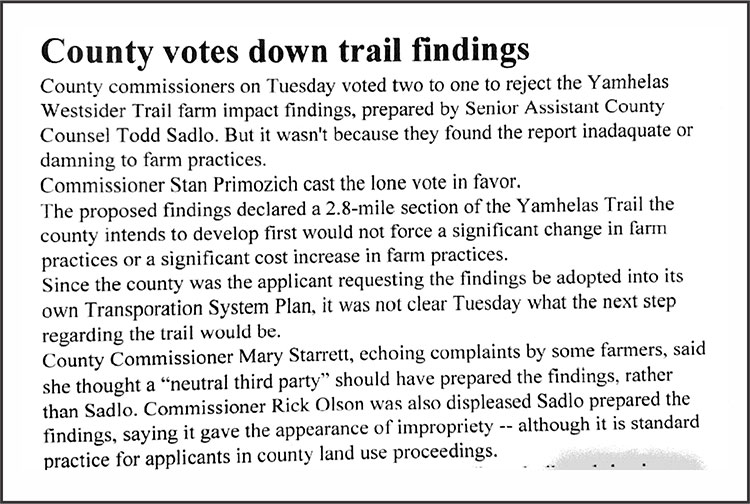
May 31, 2018 – Despite opposition from farmers and repeated warnings that the trail would not satisfy land use laws, the Board of Commissioners, this time with Commissioner Olson’s vote (after staff lobbied him for hours behind the scenes), approves moving forward with the trail. Commissioner Starrett is responsive to the concerns raised by county residents and votes “no.”
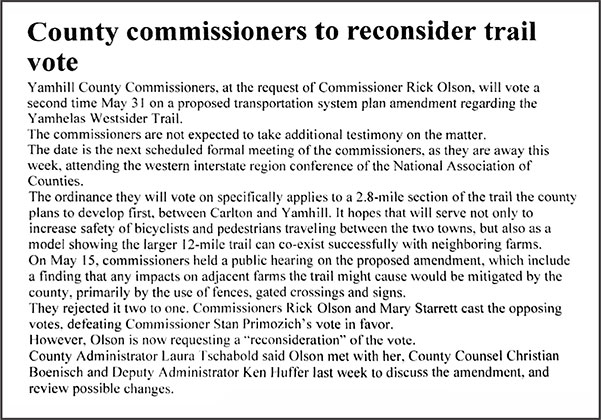
June 15, 2018 – Local farmers file the first LUBA trail appeal.
December 20, 2018 – LUBA pervasively remands first trail approval (LUBA No. 2018-061).
January 7, 2019 – County submits Connect Oregon VI grant monthly progress report to ODOT; says county doesn’t expect the remand to affect grant timelines:

February 14, 2019 – ODOT assures farmer Chris Mattson that the county is aware that it will be required to repay ODOT grant funds if the trail turns out to be illegal, but the county continues to spend public money anyway.
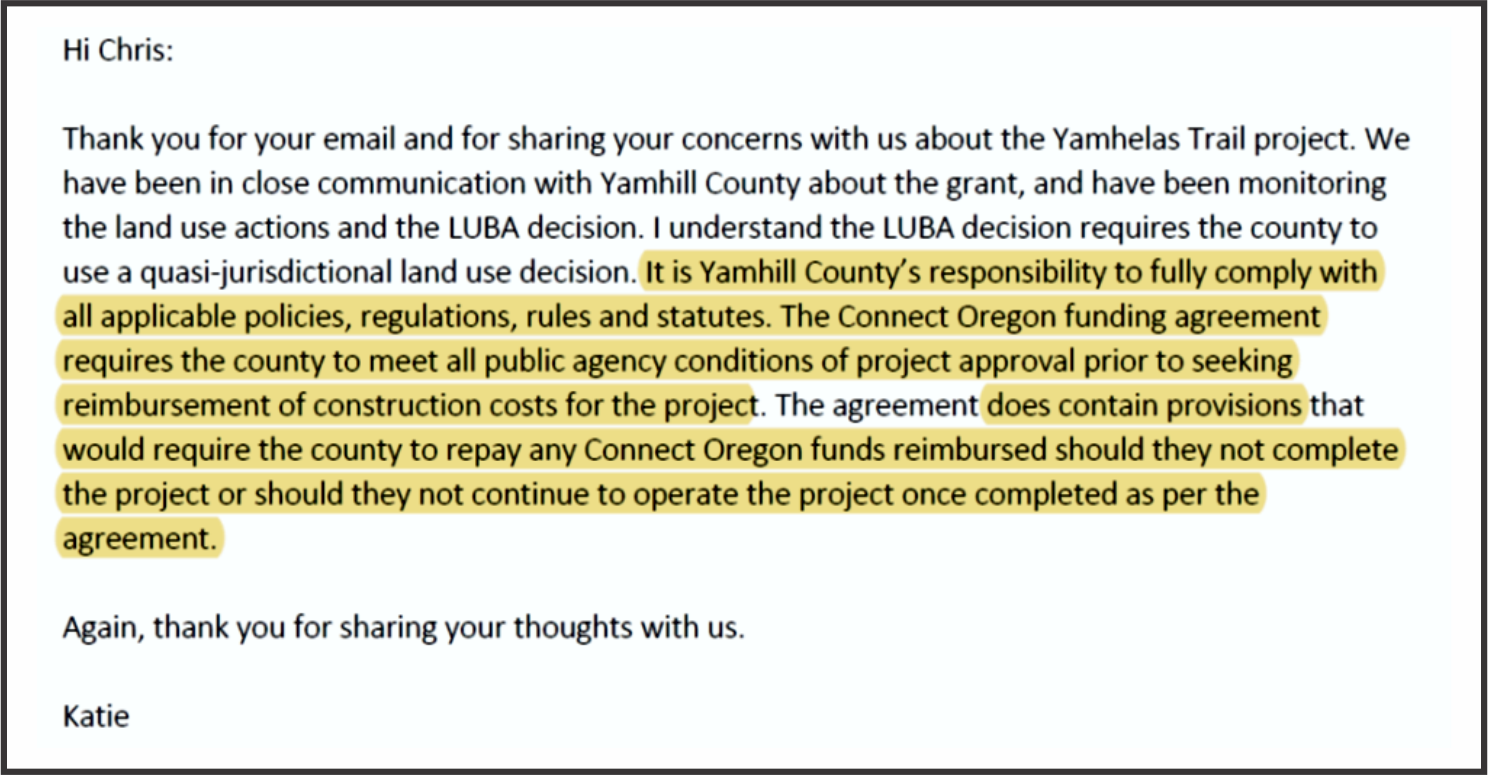
March 14, 2019 – Board of Commissioners approves contract with OBEC for Trail/Bridge design. Hearing on the LUBA remand is not for two weeks. Farmers appeal the approval of the OBEC contract to LUBA explaining it prejudges trail approval and commits the county to construct the Trail/Bridge. County briefing says that the contract does not commit the county to construct the trail bridge and that before the bridge is constructed, county will get all required land use approval.
October 11, 2019 – LUBA dismisses the bridge contract appeal on the county promise that no construction will start without land use approval and on the county’s statement that the county was not committed to construction of the bridge.
November 20, 2019 – Despite the promises made to LUBA (and the farmers), the county secretly moved forward with bridge construction. County advertises Call for Bids for Yamhelas Westsider Trail (Phase 2) Project. Despite promising LUBA that before any construction started the Trail/Bridge would first have to receive proper land use permissions, no public notice or hearing of land use approval happened.
January 16, 2020 – County awards contract to Farline Bridge Inc. The county gave no notice to anyone.
Circa March 2, 2020 – Construction of Stag Hollow Bridge begins.
March 12, 2020 – The farmers notice construction starting and file LUBA appeals for bridge construction decision. Construction started with no land use permission whatsoever. (LUBA No. 2020-032/033).
April 9, 2020 – Motion for Stay filed in bridge construction contract appeal.
April 10, 2020 – For the 4th consecutive time, LUBA AGAIN agrees with farmers and grants interim stay to stop bridge construction and eventually makes the stay permanent.
April 22, 2020 – County counsel Todd Sadlo asks Grants Manager Carrie Martin to produce a memo stating that the Stag Hollow Bridge can hold the weight of a firetruck even though he was “pretty certain none will ever need to go there”. Sadlo stated he needed it for the remand.
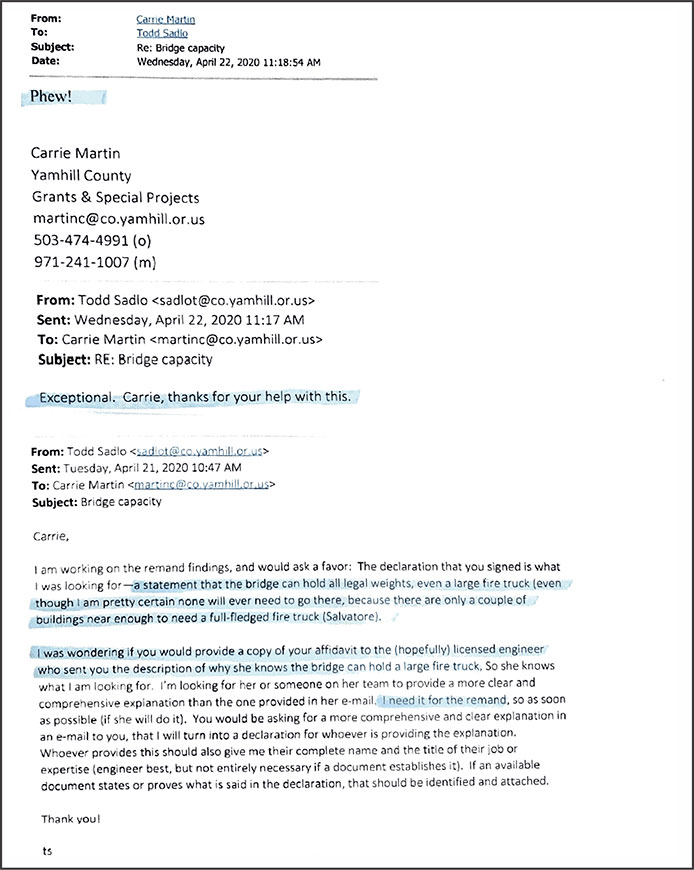
April 23, 2020 – County opposes the stay claiming the Trail Bridge is a fire access road and the county can do whatever it wants:

May 19, 2020 – Lindsay Berschauer, who campaigned in opposition of the Yamhelas-Westsider Trail, was elected by a 12 point margin in the May primary. Lindsay wouldn’t be sworn in as County Commissioner until January of 2021.
June 11, 2020 – County approves trail on remand yet again, and pushes forward. LUBA appeal filed the following day by farmers.
June 12, 2020 – Grants Manager Carrie Martin tells Farline Bridge Inc. to rush construction of the bridge and approves overtime, without consent of the Board of Commissioners.
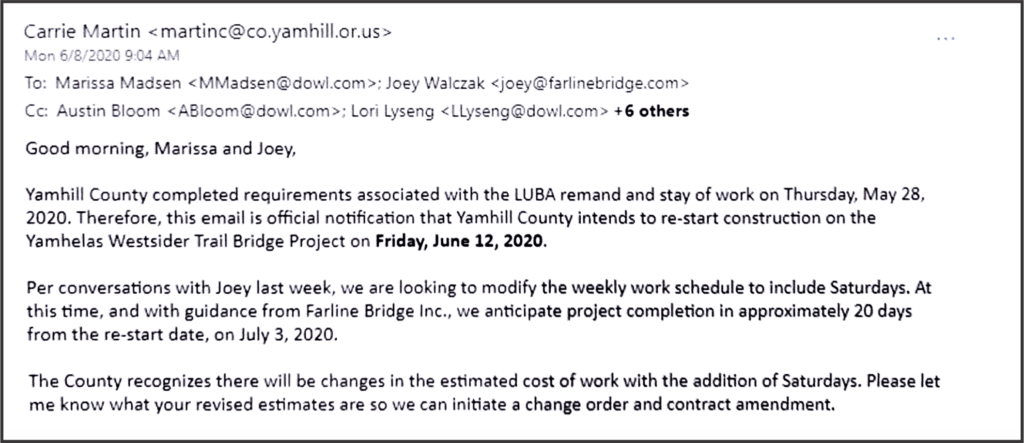
June 18, 2020 – ODOT makes it clear that they no longer believe that the trail can be built and open to the public because the county has failed to meet its land use requirements.
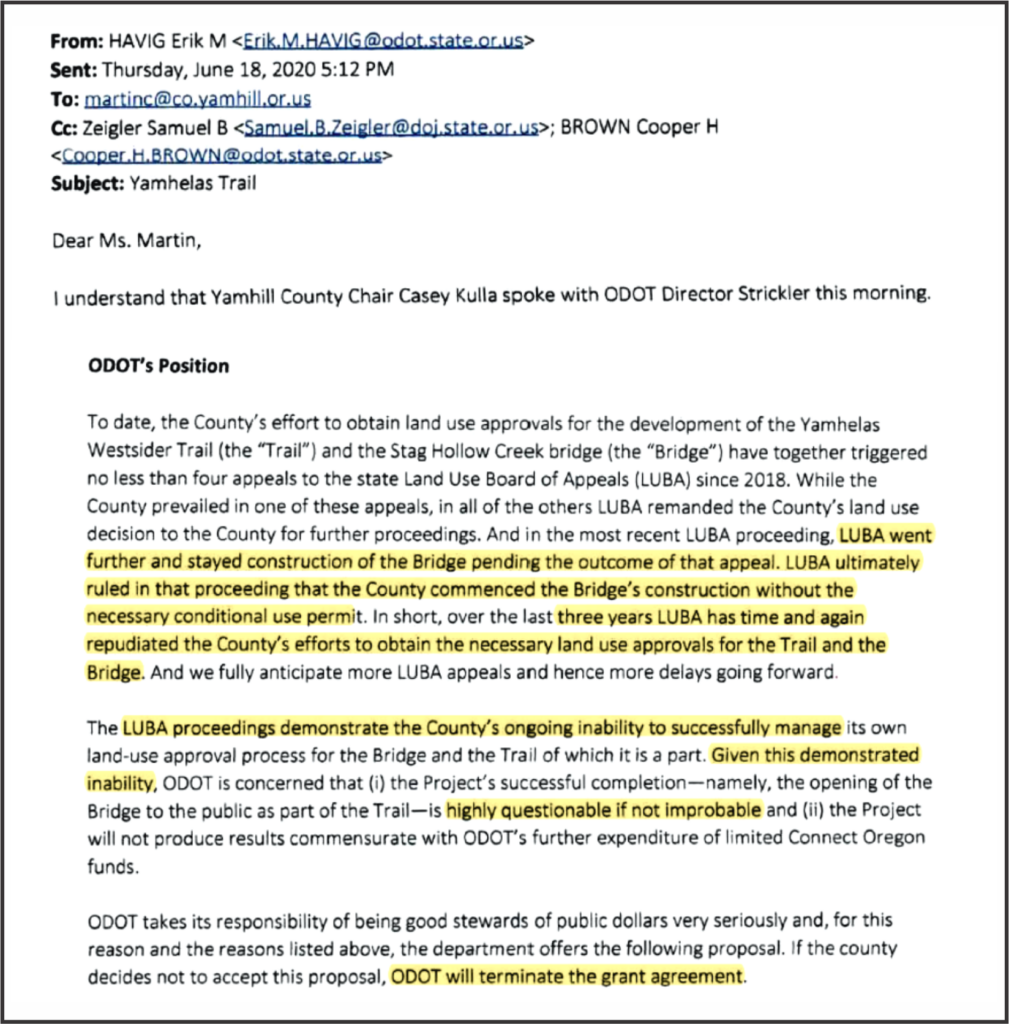
June 19, 2020 – Yamhill County staff scrambles to respond to ODOT’s termination notice and asks for a compromise.
June 23, 2020 – Commissioner Kulla emails ODOT and says the county “can afford to take this financial hit” [referring to payback of the COVI grant] but seeks compromise to continue long-term relationship with ODOT.
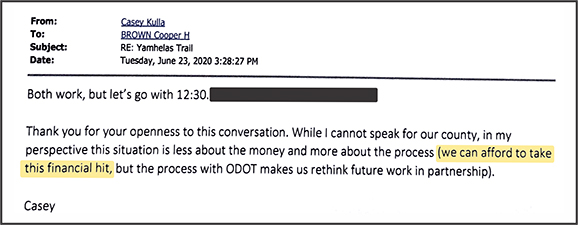
July 9, 2020 – Carrie Martin states that Stag Hollow Bridge construction costs have increased by $55,000 due to the county’s failure to obtain permits for the bridge.
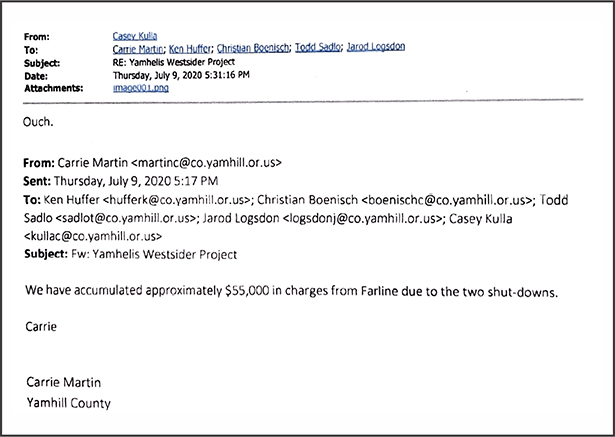
September 12, 2020 – Commissioner Kulla states that ODOT has relented and agreed to aspirational timelines for when the Trail will be open to the public. Kulla says an amendment to the COVI grant is being drafted for the Board of Commissioners to sign.
September 14, 2020 – Meanwhile, county counsel Todd Sadlo and Grants Manager Carrie Martin suggest that the county circumvent the incoming Board of Commissioners by proposing that “Friends of the Yamhelas-Westsider Trail” non-profit take ownership of the project.
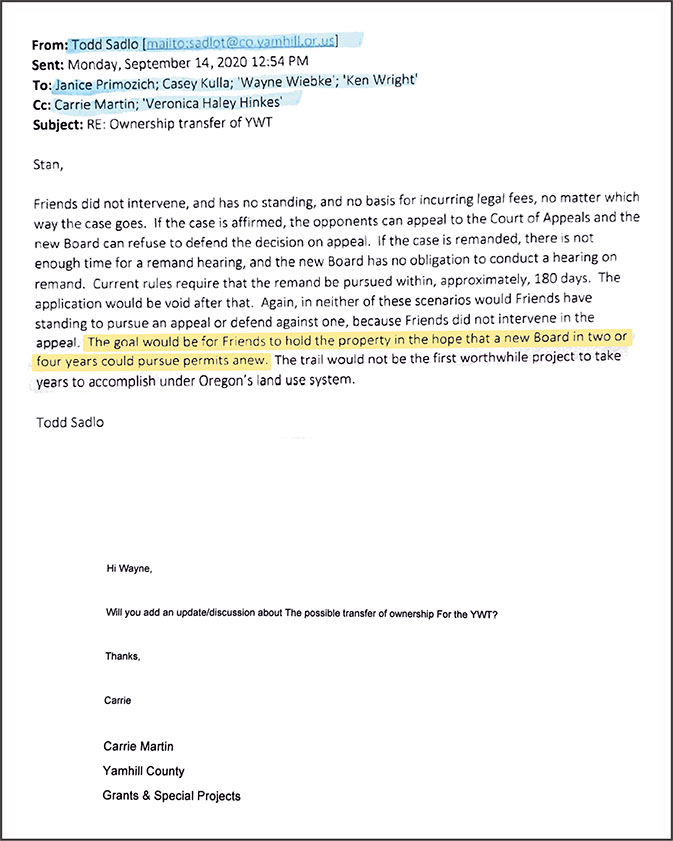
October 10, 2020 – Former Commissioner Stan Primozich, now acting board member for “Friends of the Yamhelas-Westsider Trail”, asks ODOT if they would support a transfer of ownership of the trail to his non-profit.
November 10, 2020 – After ODOT rejects the idea of transferring ownership of the trail, County counsel Todd Sadlo states in an email to the “Friends of the Yamhelas-Westsider Trail” board that “this iteration of the trail was effectively foreclosed by the voters, in the primary. My guess is the county will need to repay what has been spent on the bridge, even if the county retains the corridor”.
December 22, 2020 – Commissioner Kulla asks county staff why the COVI grant amendment hasn’t been signed and requests a special session to approve it. Staff says no and Commissioner Kulla responds by confirming that repayment of grant funds will now be necessary.
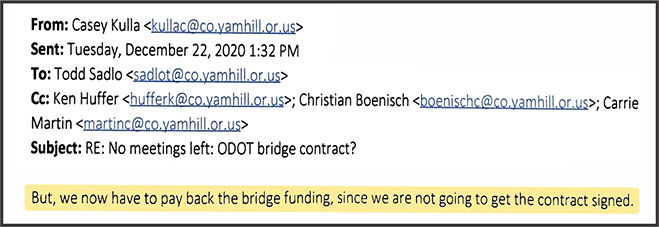
December 30, 2020 – LUBA pervasively remands trail in a fifth adverse trail order (LUBA No. 2020-066/067). LUBA sided with farmers again, agreeing that the county did not follow proper process and has not satisfied farm impacts.
January 28, 2021 – In a 4-hour public meeting, county acknowledges that it always was the case that if it did not build the trail it would have to pay back all the taxpayer money. Commissioner Lindsay Berschauer confronted Yamhill County Grants Manager Carrie Martin on her claim that the Stag Hollow Creek Bridge construction was 95% complete. Commissioner Berschauer held up current photos of the bridge and provided testimony that construction was barely even 50% complete. When Commissioner Berschauer asked Ms. Martin how the county would pay for the completion of the bridge, Martin admitted that additional grants would be necessary.
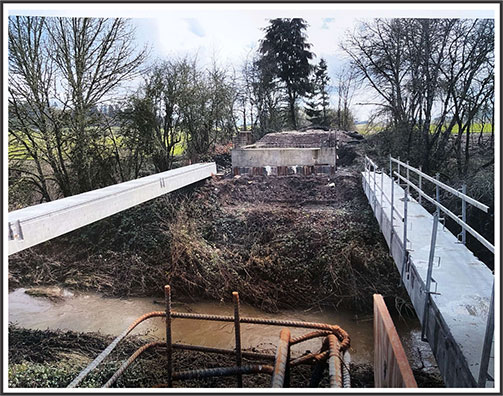
February 3, 2021 – County attempts to mediate with farmers and requests that county be allowed to finish construction of the Stag Hollow Bridge in order to “avoid repayment of grants”. Farmers decline.
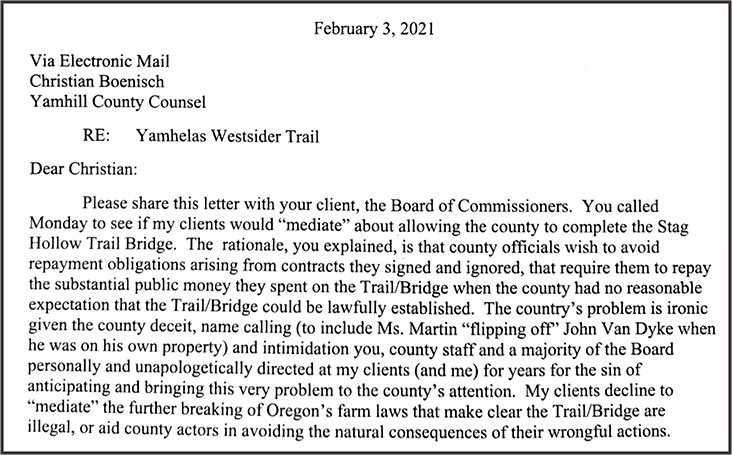
February 4, 2021 – Commissioners Mary Starrett and Lindsay Berschauer vote to withdraw the land use application for the Yamhelas-Westsider Trail.
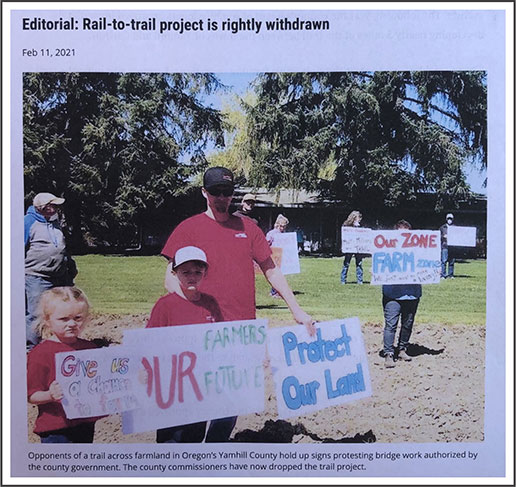
February 5, 2021 – Just days after county Grants Manager Carrie Martin was criticized by Yamhill County Commissioner Lindsay Berschauer for misrepresenting the status of completion of the Stag Hollow Bridge to be 95% complete, Ms. Martin reported to ODOT that the bridge project was only 75% complete. This confirmed that Commissioner Berschauer’s allegations of misreporting were correct.
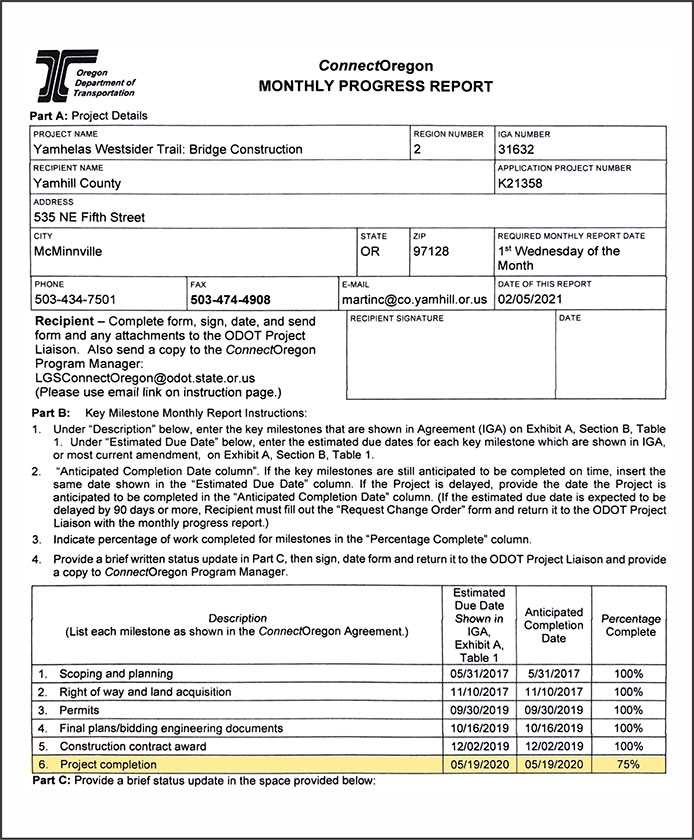
April 1, 2021 – LUBA issues unprecedented Order demanding that Yamhill County reimburse the farmers for their attorney fees associated with the final appeal. LUBA blasts the county for its claim that the Stag Hollow Bridge was really for emergency vehicle access, and not for a public trail as the grant required. Yamhill County is ordered to pay $47,533.43 to the farmers.
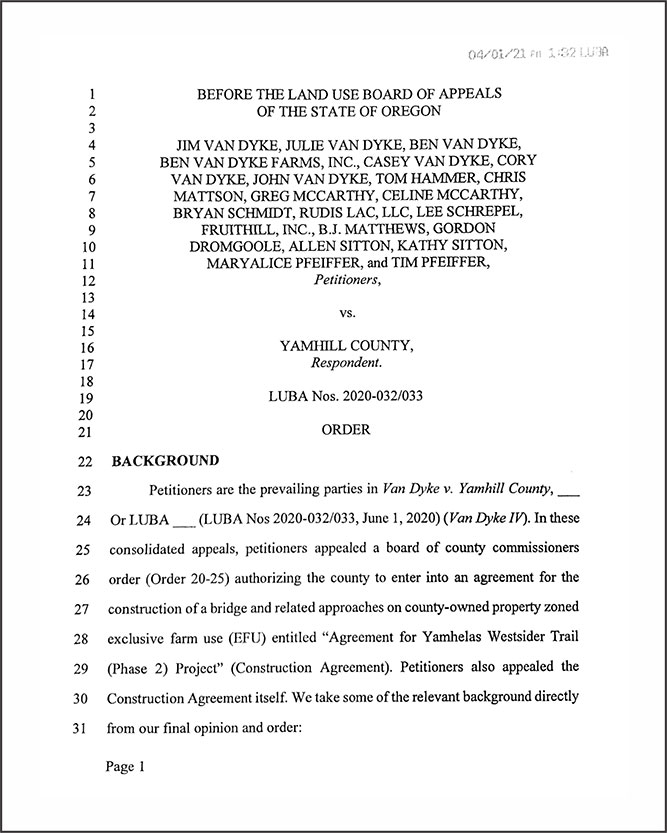
April 8, 2021 – Commissioners Starrett and Berschauer decline to continue to fund the Master Plan for the Trail and argue that it should have been done prior to any construction work and that land use approval was untenable.
May 24, 2021 – Farmers file ethics complaint with the Oregon State Bar against county counsel Todd Sadlo, alleging violations of multiple legal ethics rules that adversely affected his client (Yamhill County taxpayers).
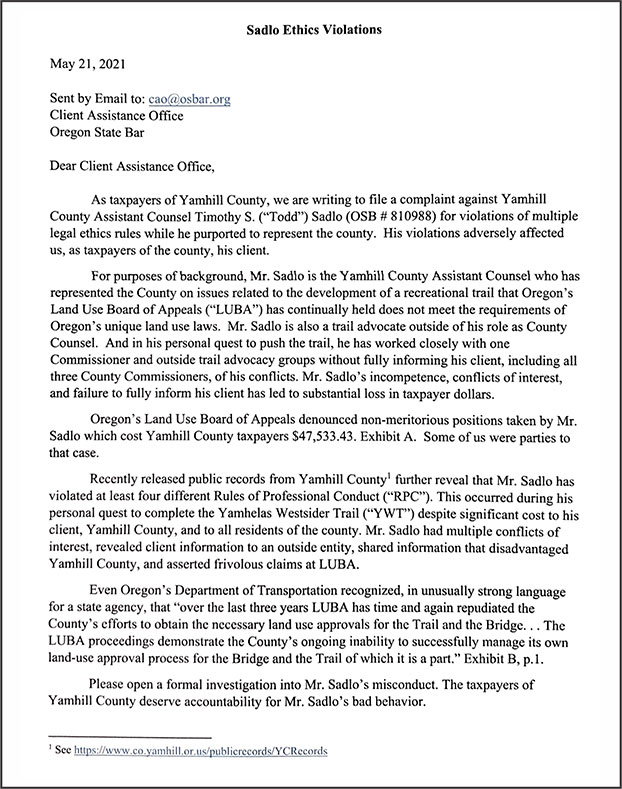
July 1, 2021 – Public records reveal that proponents of the Yamhelas-Westsider Trail, Commissioner Casey Kulla and members of county staff conspired to produce a “hit piece” against Commissioners Mary Starrett and Lindsay Berschauer by attempting to label their opposition to the trail as right-wing, racist extremism. Leah Sottile, of High Country News, released the article on July 1, 2021 and it was immediately used as grounds to justify the recall effort against Commissioner Lindsay Berschauer.
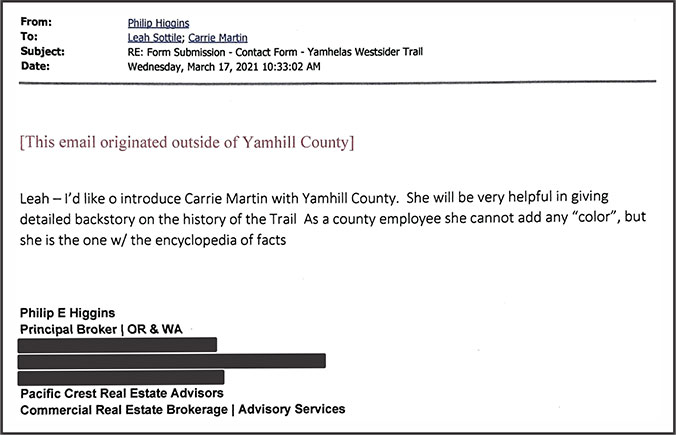
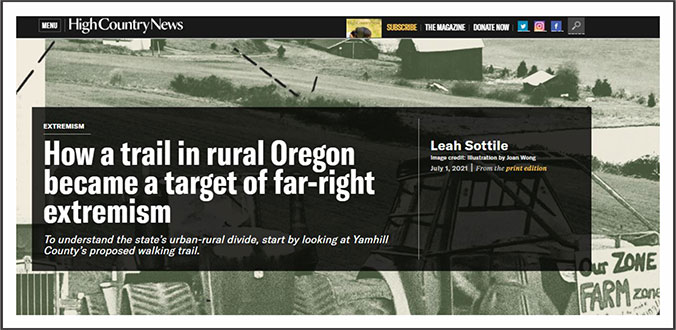
August 31, 2021 – Oregon State Bar confirms investigation into county counsel Todd Sadlo’s actions is active.
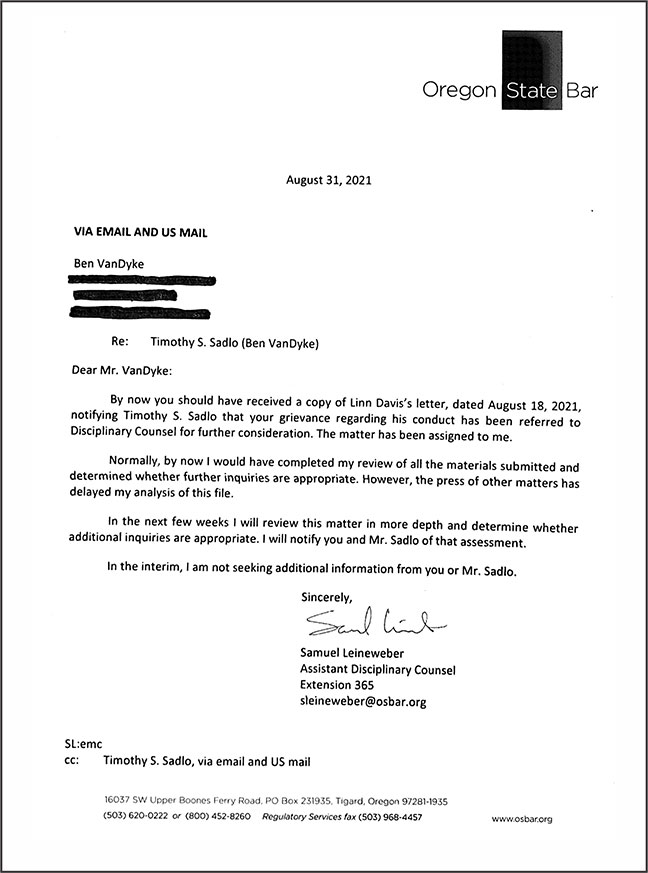
Conclusion
In summary, the records show that key staff and a majority of the Board of Commissioners, including former Commissioners Mary Stern, Stan Primozich, Rick Olson and current Commissioner Casey Kulla, knowingly, purposefully, and intentionally took a gamble by continuing to spend public money on a project that had very little chance of gaining lawful land use approval. The public records show that they pursued the Yamhelas-Westsider Trail through intimidation and deceit, and sought to limit public involvement and to marginalize Yamhill County’s generational farmers.
Current Commissioners Mary Starrett and Lindsay Berschauer acted ethically in ending the trail project and protecting private property rights.
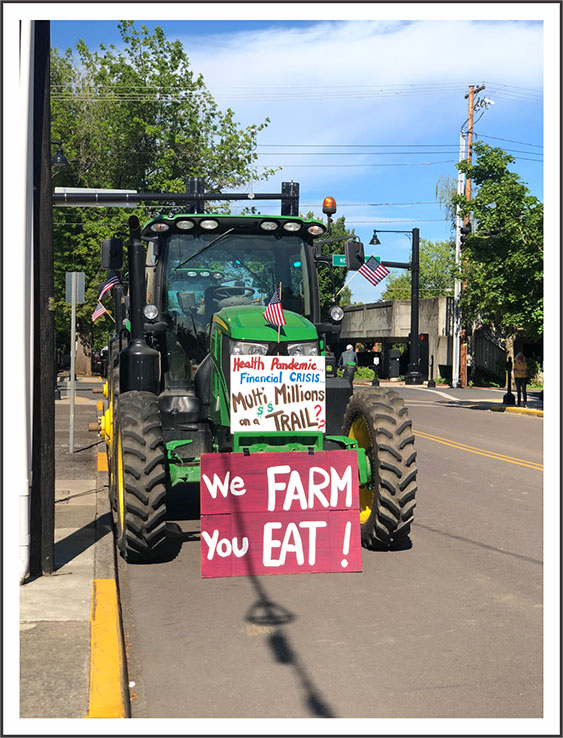
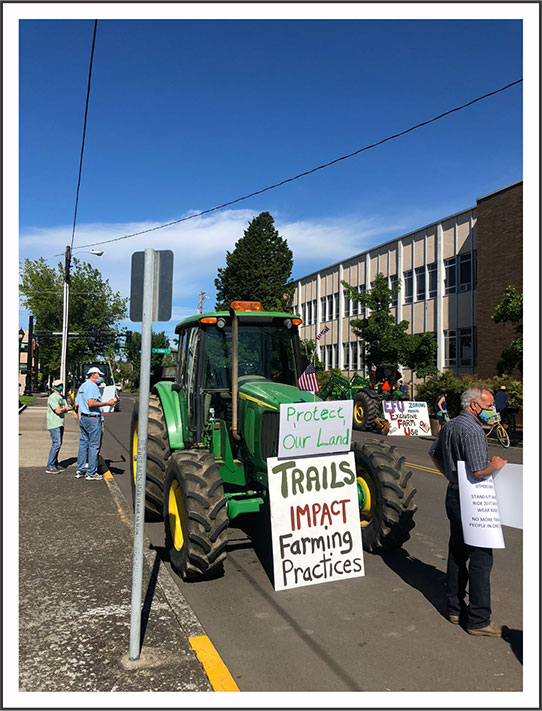
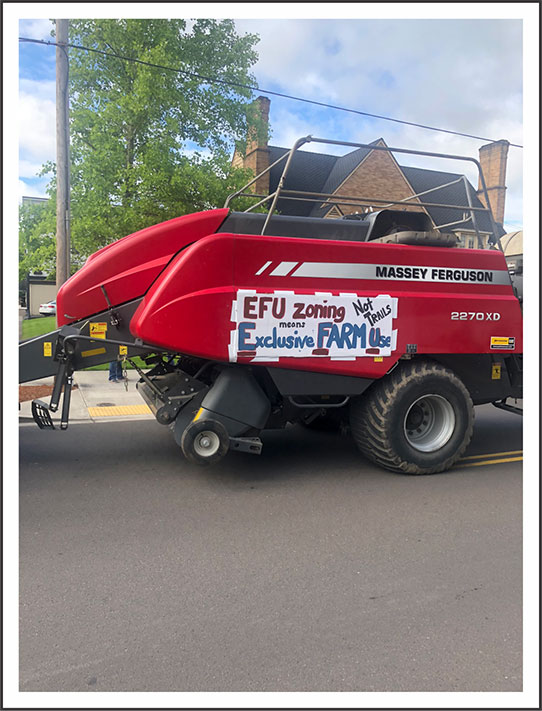

The Oregon Family Farm Association is dedicated to protecting the heritage of Oregon’s family farms. Oregon Family Farm Association helps farmers by protecting their property rights in the courtroom and educating the public about the health and future of family farming.
Your annual support of the Oregon Family Farm Association includes a subscription to Oregon Family Farmer magazine. If you are interested in joining the Oregon Family Farm Association, please mail your donation to Oregon Family Farm Association, P.O. Box 23504 Tigard, OR 97281.